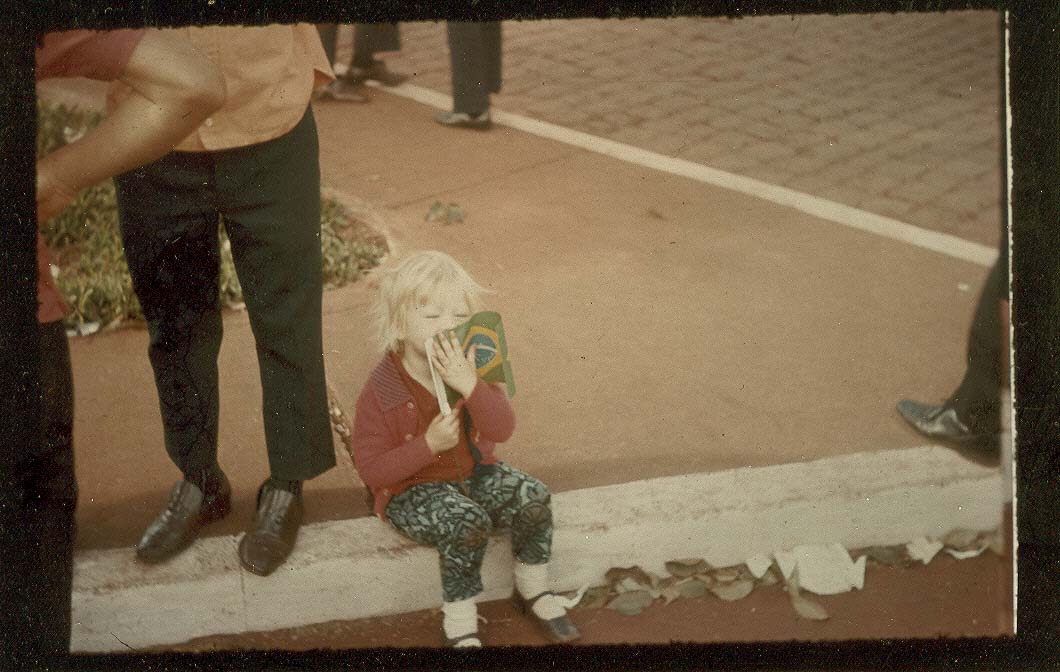
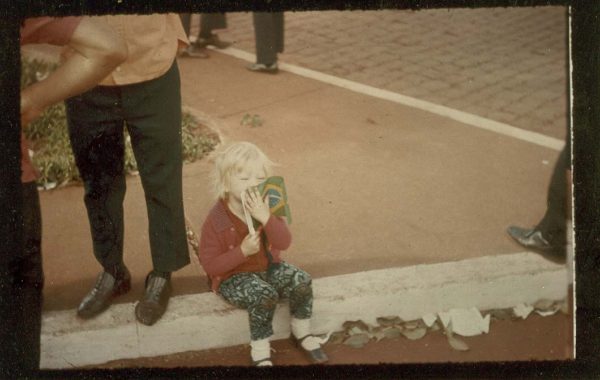
Helen kissing the Brazilian flag, 1970.
That’s my sister, Helen, kissing the Brazilian flag at a parade in our home town in Maringá, Brazil. It’s one of my all-time favorite photos! Oblivious to whatever is going on around her, her love seems pure and complete. We were missionary kids, Americans on South American soil. She and my brother were born there, so they had dual citizenship. I was a baby when my parents went, so I was always the “American” one. Today is Independence Day here in the United States. The kids outside are setting off fire crackers terrifying my dogs who huddle next to me. This day, as it does every year, brings back memories of those days in Brazil, the struggle with identity, and what flags have meant to me.
Two memories of fireworks:
The American families congregated together in a large clearing and set off fireworks on night. I must have been around ten years old and this was down in Brazil. I remember feeling awe about the colors and the noise, as well as fear that the sparks would land on me and set my hair on fire. ???? Americans excited about their country in a place where nobody else could relate.
We were all at my parent’s in Wisconsin for a visit. This is now the mid 1990’s, I think. I lived in Chicago, my brother was a pilot at the local airport, and my sister was in college. We went to the small town’s 4th of July celebration, fireworks over a pond they call Mirror Lake. My brother had rented a small plane and he and his wife flew up into the night, dancing around the fireworks. It was so beautiful! My brother up there in the night, flying free with those explosions of color and sound.
The Flag
Both the American and Brazilian flag became symbols for us, especially when the other country was far away. When we are here, we smile when we see the Brazilian flag. When we were there, the American flag meant a safe haven. Here we are at a family reunion, a few years after my brother flew around the fireworks:
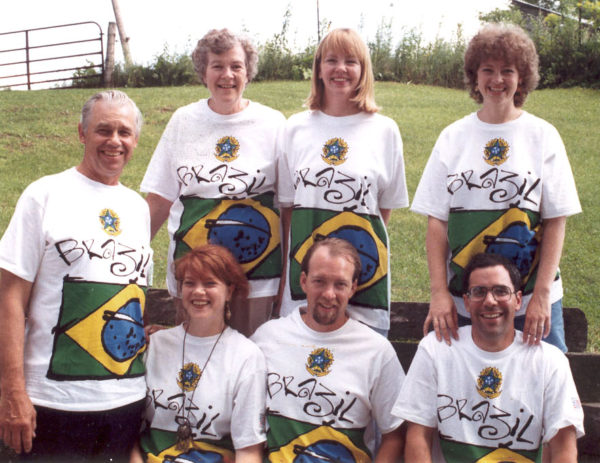
.
When we were growing up in Brazil, the flag was not allowed to be displayed in this way. One could not wear it, make art out of it, or do anything to change it or deface it. The flag was sacred.
All flags have meaning. The Brazilian one: Green for fields and forests, yellow for gold, blue for the sky, stars for the states and through the middle, the statement “Order and Progress”. The American one: Thirteen stripes for the colonies, stars for states, red for valor, white for purity, blue for justice. We moved back to the U.S. in 1980 and it was bizarre to see the American flag used everywhere on everything, sometimes with love and pride and at other times with scorn and protest. Morna Crites-Moore, one of our TAFA members, has used the flag in her art work, following in a tradition of American folk art with a contemporary twist:
.
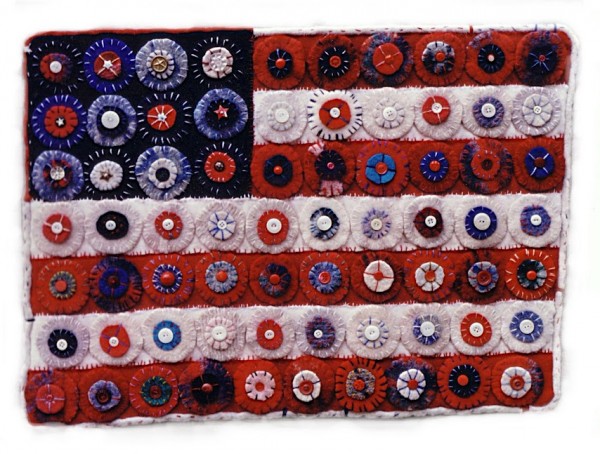
‘Doug’s Flag’ by Morna Crites-Moore, 2001
.
Our feelings about the flag all depend on where we stand at the moment. My purse was stolen with my passport in Colombia back in the early 1980’s. I was welcomed to the American Embassy, walked right in and got an immediate appointment, while a long line of Colombians waited outside, stretching all the way around the blog, wearily hoping for a visa out of their own country. Being an American in Brazil in the 1960’s was about the same as being rich. I didn’t know if other kids wanted to be friends with me because of me and my amazing personality or because I was an American. Kennedy was a huge hero and everybody wanted access to stuff from the US: music, candy, jeans, the culture.
By the 1970’s both flags, Brazilian and American, took on a malevolent persona. Brazil had become a military dictatorship with thousands of protesting students and social leaders disappearing. Some were released and had stories of torture. Bodies were found. Alliances made with the C.I.A. and large corporations created distrust and an underworld of rebellion. American foreign relations had a long history of a double edge sword: the builder and the destroyer. While American aid built clinics in Africa and rescued refugees around the world, U.S. interests also inflicted pain and misery of unimaginable scale in third world countries. Our veterans have good reason to celebrate the raising of the flag in Iwo Jima during WWII, but how does the same image sit with survivors of that war in Japan?
.
Most of us who have a mixed cultural identity struggle with feelings of patriotism and nationalism. My father told me when I was a teenager, “You will be able to live anywhere, but you will not belong anywhere.” How true this has been, so many decades later. I define my cultural identity, without hesitation, as American. The dominant reference points and language of my dreams comes from this country, in American English. But, it is also informed, balanced, challenged, and made rich by the rest of the world. My best friend when I was growing up was Japanese-Brazilian. My best friend now is from Afghanistan. In between, there have been close Africans, Tibetans, Mexicans, Germans and a whole rainbow of other cultural influences that have made my life interesting, fun, and exciting.
Patriotism: What does it really mean? A quick look at definitions on the web basically agrees on ‘devotion to one’s country‘. I see that as meaning that one should do the best possible to be a good citizen, to make one’s place in the world, the best it can be. Unfortunately, we live in a polarized time where the picture of a patriot, at least in my mind, is of a red neck bully unable to discuss differences of opinion or to embrace change. Informed dissent should be one of the protected pillars of a democracy, helping to keep checks and balances in place so that power and greed do not take us down the road of totalitarianism and injustice. One can be devoted to a country, to a place and yet disagree with ‘the way things are’.
Brazil today is a different place from when I grew up there. Real estate prices in my home town are comparable with Chicago’s Gold Coast in dollars. I looked at my old street on Google Maps recently and almost all of the houses had swimming pools in their back yards (instead of chickens). Brazilians flood to the US for tourism and shopping. Although they have social problems, as we do, it is a super power in charge of its own destiny.
The whole world wants that privilege: the ability to define for themselves what their cultural identity means for them and how they fit within the larger global economy and dialogue. My belief is that until we all see ourselves as global citizens first and as cultural beings second, we will continue to waste our time and energy on useless dynamics for control. Of course, this is all tied into profit and ‘safety’, but the more familiar we become with each other’s food, music, film, dance, ecumenism, literature and all of the gifts that each brings to the table, we find the joy of sharing rather than taking. I long for the day when minimum wages will be the same all over the world, when all have access to education, housing, and healthcare. Many would see this as unpatriotic, as socialist. I see it as sensible and just.
Independence: The opposite of dependence, right? Dependence can be a good thing: I depend on you, as my neighbor, to treat me well, the Golden rule. I depend on my family to love me. I depend on God for meaning. But, it can also bind and blind. We celebrate a country’s historical separation from the crown of England, the right to self-determination. I challenge all of us to go beyond that historical event and look at what enslaves us now. What keeps us from being the best Americans we can possibly be? We could begin by having some patience with other Americans who disagree with us. Democrats, Republicans, Tea Partiers, Green People: adopt one as a friend! Who are we bombing? Get a pen-pal over there. Move out beyond your own cultural identity and expand that flag. Stretch the brain, exercise the heart, and break old chains. Then, celebrate this independence!
.
Exercise: Get some people together (kids, Sunday School, Quilt Group, family, friends, etc.) and design a new flag. First, talk together about what colors might mean, what symbols would be meaningful to you. Separate and each make a flag on a sheet of paper (half an hour limit). Come back together. Go around and let each person talk about what their flag means to them. Then, as a group, draw out a new flag that represents your group. You might pick elements that you liked from the individual flags or come up with new ideas inspired from them. If you have a blog or a site where public images can be seen, post it there and leave a comment and link here. I’ll add them to this post along with the link to your blog.
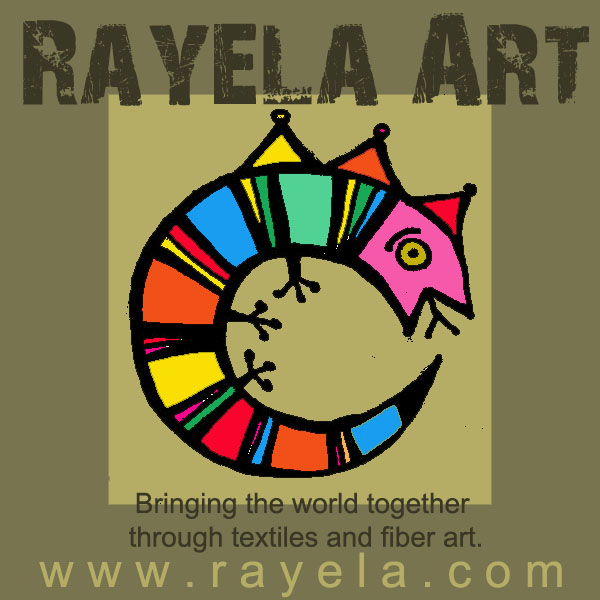
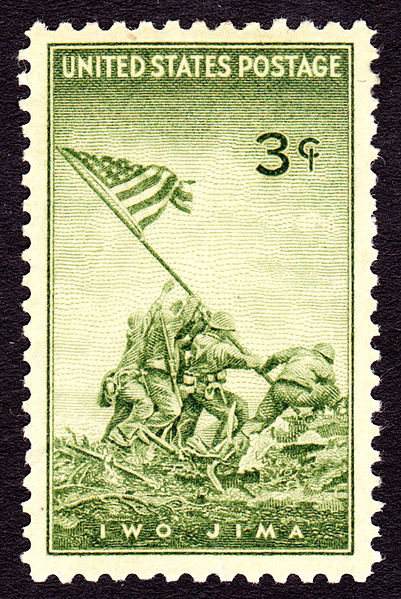

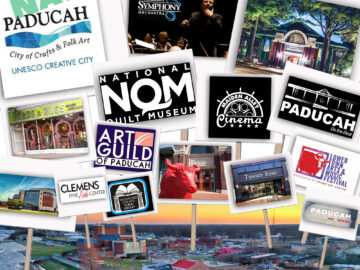
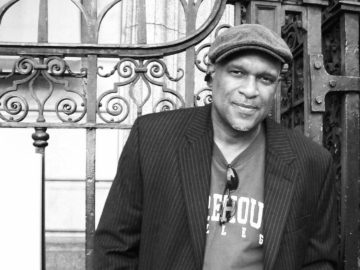
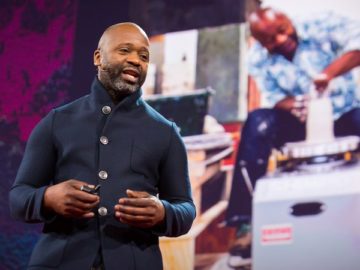
As always, you write an interesting post. Thanks so much for including “Doug’s Flag” in your essay. 🙂
Thanks, Morna! I love your work and am glad that you were fine with having it here!
Rachel, This is an excellent,stimulating, thought-provoking,informed essay that captures your feelings and the feelings of many other M.K.s and “third culture kids.” Not only excellent but outstanding! Your always wise and thinking father said it so well, probably grieving as he said it with such insight,“You will be able to live anywhere, but you will not belong anywhere.”
You do belong.
With us!
Abracos,
Dave
Why, thank you, Dave! Coming from you, that is quite the endorsement! It’s true, we third culture kids do seem to have common ground, even if we grew up in different countries. Both my sister and I gravitated naturally to the International kids when we were in college, all kind of huddling together in astonishment at trying to understand this new country. Then, throughout my adult life, there has been this ease with immigrants and displaced peoples. But, there is a difference with immigrants and with those of us grew up as foreigners as we have no points of reference to call “home”, while most immigrants have left a defined place of origin. It’s all very interesting to me, especially in the context of having a national or cultural identity. I find “patriotic fervor” so dangerous and destructive these days, so I see the confusion of identity that our parents put us through as a gift, one that can hopefully help calm things down a bit. Abracos back to you!
Thank you Rachel. A most thoughtful, loving and rare perspective of flag, country and patriotism. Rare in that this is not the words we see in the newspapers or hear on the news. Not so rare in that I think overall, most people believe this but remain quiet in their views. Again, thank you for the lovely words and this insight into you.
You’re so good with words, Rachel!